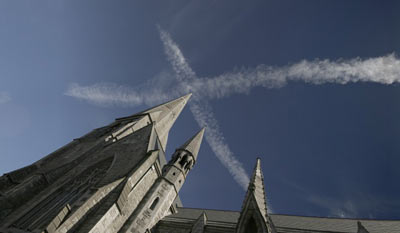Faith
Looking at the Pew Study: Danger Ahead?

What are we to make of the negative Catholic headlines last week from the Pew study of religious affiliation?
“Catholicism has experienced the greatest net losses as a result of affiliation changes” …
“Approximately one-third of the survey respondents who say they were raised Catholic no longer describe themselves as Catholic” …
“Roughly 10% of all Americans are former Catholics.”
It’s not entirely clear, at least based on the analysis of the Pew Study released Friday by CARA, the Center for Applied Research in the Apostolate at Georgetown University (thanks to Meredith Gould for forwarding the study).
CARA compared the Pew results to their own research conducted in 2003. And on the surface, their earlier study shows a less bleak picture.
First, the 2003 CARA data showed a smaller percentage of people who were raised Catholic who had left the faith (5.9% compared to 10.1% for Pew). One possible explanation of the difference, according to CARA, may have been a methodological flaw admitted by Pew that may have underestimated Catholic affiliation by Latinos by 10 percentage points—a huge number. As CARA says, this should have been mentioned in the news reports.
Second, the CARA analysis pointed out that because the Catholic Church is the largest Christian denomination, citing absolute numbers will be misleading. Their comparative analysis of the Pew data for defections by religion and denomination showed that Catholics had the 3rd best retention rate—68%. Only Jews and Mormons ranked higher. Not a reason to cheer, exactly, but it does put it in perspective.
Third—and most interesting—CARA pointed out that the Pew study didn’t show when people left their religion. CARA’s own 2003 research showed that “a majority of those who were raised Catholic and who have since left the faith stopped considering themselves Catholic before 1988 (51 percent).” The CARA figures also showed that almost one-fourth of the defections happened before 1962—before Vatican II, the event associated with the collapse of Catholic identity.
But what CARA didn’t mention in their narrative was a recent trend that leaped off the data table: 23.6% of the lapsed Catholics—almost a fourth—had left the Church in the 5 year period just prior to the study, 1998-2002.
That’s a reason for concern. Is it possible this acceleration in defections continued through the years after 2002? And does it partially account for the larger number of lapsed Catholics measured in the more recent Pew Study? Certainly, the acceleration rate would have needed to be large to make up the difference. But it’s not impossible, given the sex abuse scandal which exploded in 2002.
So, while the CARA analysis puts Catholic losses in perspective by showing defections over time, and compared to other religions and denominations, it also opens a question: Has the situation been getting a lot worse recently?
We’ll know soon enough.
By AT 03.04.08 05:52AM Not Rated
While I appreciate the context the CARA report supplies, and recognize the aptness of Peter’s comment, I think we have to recognize bad news as bad news. There’s a lot left to be desired in our catechesis and how we engage the world.
In “Marrying Tradition and Modernity” (WSJ, February 22, 2008), Christine B. Whelan reports that the Catholic Church’s teaching about marriage has been “largely ineffective.” As to Catholic young adults she writes, “only a ... quarter report that their views about marriage have been formed in significant part by their faith. Indeed, a minority think of marriage as a ‘vocation’ or a ‘calling from God,’ and nearly half of singles say it’s not important that their future spouse be Catholic. Rather, the vast majority of 18- to 25-year-olds report that their spouse must be their ‘soul mate,’ and that falling out of love is an acceptable reason for divorce.”
Obviously, given the overwhelming influence in our culture of secular mass media, the Church faces a daunting task. Buy we have to face up to it rather than finding what comfort we can and going back to business as usual. It drives me crazy, frankly, that we are now the ones fiddling while Rome burns.
By AT 03.04.08 08:28AM Not Rated
I agree with Harold. While I know many faithful who view this time in the Church as an inevitable time of “pruning”, it should break our hearts that our brothers and sisters are leaving. It’s a travesty that we have so many souls so close to the Truth and so close to the Body of Life and we are missing opportunities to reach them and help them to—borrowing from Last Sunday’s Gospel—“see” this.
I agree, business as usual will not do..









By peterwilson1 AT 03.03.08 09:55PM Not Rated
I think Benedict XVI is correct in his own analysis of this phenomenon…that we must get comfortable with the real possibility of a much smaller CC…perhaps less populated parishes and more Gospel-oriented communities with a more faithful witness to Christ. SOunds real good to me!